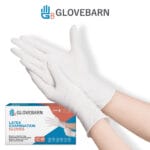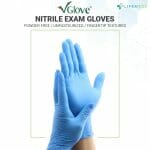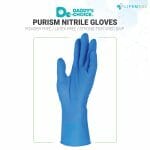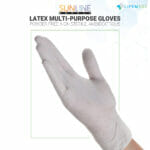Navigating the intricacies of an engineering work environment can be challenging, with risks ranging from chemical exposure to cuts and abrasions. For engineers, it’s crucial to have a strong protection barrier between the skin and potential hazards. Nitrile gloves are the best type of personal protective equipment (PPE) gloves for engineering.
Engineering environments often pose substantial risks, including potential exposure to harmful chemicals, sharp instruments, and abrasive materials. Nitrile gloves provide an essential barrier during these tasks, offering excellent resistance and protection against potential dangers. Nitrile gloves have many benefits for engineering, such as their excellent chemical resistance, reliable durability, and allergy-free considerations.
- Disposable gloves are made from synthetic rubber.
- Specifically, nitrile butadiene rubber (NBR).
- Providing an excellent alternative for individuals with latex allergies.
They are known for their superior resistance to oils, fuels, and certain chemicals, making them a preferred choice across various industries, including healthcare, food service, and engineering. Nitrile gloves offer significant protection against punctures, cuts, and abrasions and can be made thin enough to maintain dexterity and touch sensitivity, which is crucial for detailed tasks. Nitrile gloves are powder-free, leaving no residue, which can be essential in specific applications such as painting or sealing. In essence, nitrile gloves provide a durable, flexible, and comfortable solution for hand protection in numerous work environments.
Choosing the Best Gloves for Engineering
Several key factors must be considered when selecting the best gloves for engineers. First, the type of work being performed should guide the selection. With tasks that involve exposure to chemicals or oils, nitrile gloves, known for their chemical resistance, are a fitting choice. For tasks that require a high degree of precision, nitrile gloves offer dexterity and touch sensitivity. Work gloves should protect against punctures, cuts, and abrasions. Engineers wear gloves for extended periods, making choosing gloves that fit well and feel comfortable important. Ultimately, the best gloves for engineers depend on the nature of their work, with features including resistance properties, agility, durability, and comfort.
The Benefits of Nitrile Gloves for Engineers
Nitrile gloves are made from a synthetic rubber called nitrile, a copolymer of acrylonitrile and butadiene. They are highly durable, puncture-resistant, and unlike latex gloves, they do not cause allergic reactions, making them a preferred choice across various industries, including engineering. Nitrile gloves offer advantages over traditional latex or vinyl gloves, particularly for engineers needing superior personal protective equipment (PPE) gloves.
Regardless of specialization, engineers often operate in environments that demand high precision, safety, and hygiene. The nature of their work exposes them to various hazards, including chemical spills, sharp objects, and even the potential for cross-contamination in specific environments. For this reason, personal protective equipment (PPE) gloves are crucial to ensure their safety and that of their projects. With all their many benefits and versatility, nitrile gloves are an engineer’s best companion.
Chemical Resistance: Shielding Engineers from Hazardous Substances
Gloves with chemical resistance are essential for engineers that handle and work with various chemicals and substances in engineering tasks. Nitrile gloves offer excellent resistance to chemicals, including oils, fuels, greases, and other engineering substances. Ensuring that your engineering gloves can provide high protection against potentially hazardous materials and chemicals helps reduce the risk of exposure and health hazards.
Durability and Puncture Resistance: Reliable Protection for Demanding Tasks
In environments where sharp objects, rough surfaces, or heavy machinery is common, gloves should be able to withstand physical stress. Nitrile gloves are known for their exceptional durability, offering three times more puncture resistance than traditional latex gloves. For instance, the durability of nitrile gloves for mechanical and civil engineers is highly beneficial while conducting hands-on work. This makes them ideal for tasks that involve sharp objects, rough surfaces, or potential mechanical stress. Gloves that can withstand engineering tasks without tearing or comprising protection, like nitrile, are the best gloves for engineers.
Sensitivity and Dexterity: Enhancing Precision and Productivity
While nitrile gloves offer durable protection, they provide good sensitivity and skill. Engineers need gloves that accurately manipulate small parts, tools, and equipment. Nitrile gloves allow precise movements and tactile feedback, enhancing productivity and safety during engineering tasks. The snug fit and flexibility of nitrile gloves ensure engineers can perform tasks that demand high precision without discomfort.
Sustainability: Environmentally Friendly Gloves
With the increasing focus on sustainability in personal protective equipment (PPE) gloves, nitrile gloves are a standout choice. Nitrile is a synthetic rubber, meaning no natural resources are depleted in the production of nitrile gloves. Additionally, they are recyclable, reducing their environmental impact. Nitrile gloves are hypoallergenic and latex-free, reducing the risk of allergic reactions among wearers.
Allergy Considerations: Nitrile Gloves for Latex-Sensitive Engineers
Nitrile gloves are an excellent alternative for individuals with latex allergies. Latex-free gloves are essential for engineers with sensitivities or work with others with latex allergies. Nitrile gloves do not contain latex proteins which help reduce the risk of allergic reactions in the workplace.
Comfort and Fit: The Perfect Glove for Optimal Performance
When selecting gloves for engineering purposes, it’s crucial to consider the thickness of the gloves to ensure they can provide optimal protection during tasks. With their thick durability, nitrile gloves are designed to provide a snug and comfortable fit while offering flexibility and ease of movement. They come in various sizes, allowing engineers to find the right fit for their hands and enhancing comfort during prolonged use.
Versatility: The Best Protective Gear for Engineers
Engineering is a broad field with various specializations, each with unique risks and demands requiring personal protective equipment (PPE) gloves. Nitrile gloves are versatile and adaptable, suited for almost any engineering environment. Whether in electrical, environmental, software, or aerospace engineering, nitrile gloves provide the protection needed to maintain a safe and productive work environment. Engineers face unique challenges in their work environment, and their safety is paramount. Nitrile gloves, with their superior chemical resistance, puncture resistance, comfort, and versatility, are the best protective gear for engineers.
Reference:
- National Library of Medicine, 2010. Preventing Transmission of Pandemic Influenza and Other Viral Respiratory Diseases: Personal Protective Equipment for Healthcare Personnel: Designing and Engineering Effective PPE.


















